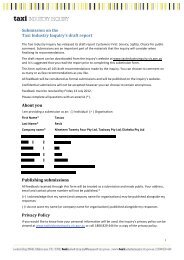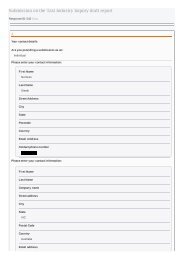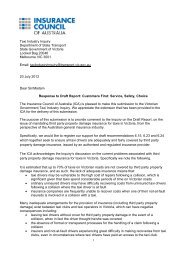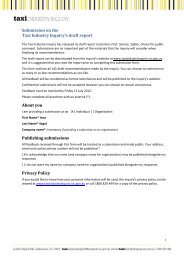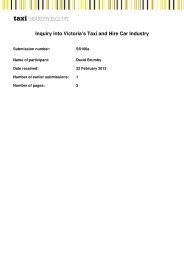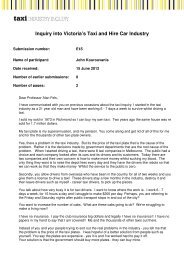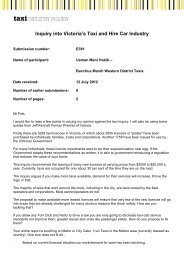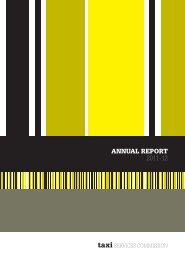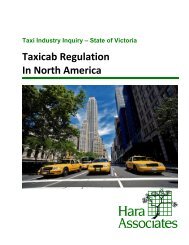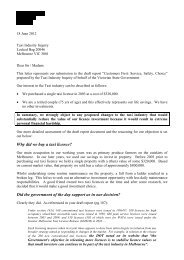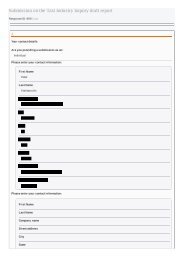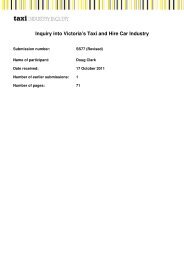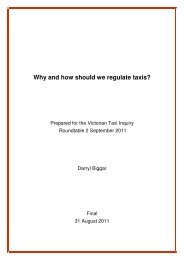Part D â Understanding and improving industry performance (PDF ...
Part D â Understanding and improving industry performance (PDF ...
Part D â Understanding and improving industry performance (PDF ...
You also want an ePaper? Increase the reach of your titles
YUMPU automatically turns print PDFs into web optimized ePapers that Google loves.
Inquiry findings<br />
è The existence of substantial economic<br />
rents (exemplified in taxi licence values<br />
<strong>and</strong> in the licence assignment price <strong>and</strong><br />
terms <strong>and</strong> conditions) suggests that fares<br />
are too high <strong>and</strong> that the community<br />
makes far less use of taxis than it would<br />
if fares were based on the true economic<br />
costs incurred in providing the services.<br />
è The benefits of entry restrictions<br />
accrue to licence holders, not to<br />
taxi operators or to taxi drivers.<br />
è Supply restrictions also create issues<br />
for the <strong>industry</strong> in meeting dem<strong>and</strong><br />
at peak times of the week.<br />
è The Victorian Government does not currently<br />
collect the information that is required to<br />
effectively regulate taxis under the current<br />
regulatory structure. This means there are<br />
serious doubts that the restrictions on taxi<br />
licence quantities produce the right number of<br />
taxi-cabs to serve consumer interests.<br />
10.2.6. Regulations applying to entry of<br />
hire cars<br />
In metropolitan Melbourne, hire car licences are not<br />
subject to the same kinds of controls as those applying<br />
to taxis. In 2002, the Victorian Government removed the<br />
public interest test on new hire car licences, allowing<br />
open entry for new providers into the <strong>industry</strong>. The<br />
Minister for Transport at the time suggested that “these<br />
applicants will now be able to purchase new hire car<br />
licenses as of right, allowing a greater number of licences<br />
<strong>and</strong> increased competition within the hire car market”. 50<br />
However, the Government did not offer new licences at<br />
no charge. Rather, it decided to release new licences at a<br />
price of $66,000 (GST inclusive). The reform package in<br />
2002 included a commitment to review this fee within two<br />
years. This review was undertaken by the ESC, which<br />
recommended a lower fee of $44,000 (GST inclusive).<br />
The Government subsequently decided to set a fee of<br />
$60,500 (GST inclusive).<br />
50 www.dtf.vic.gov.au/domino/Web_Notes/MediaRelArc02.nsf/<br />
fce5683f42af57f04a256b36001bd4df/f9d205ebae17dd35ca256bb50<br />
008adc0!OpenDocument, accessed 27 January 2012<br />
Outside metropolitan Melbourne, the public interest test<br />
for hire car licences has been reinstated. Licences are<br />
issued at a cost of $20,500 (GST inclusive) per vehicle.<br />
Vehicles operating on Country Hire Car licences are<br />
issued with special identifying VHC registration plates.<br />
The VTD will consider applications for Country Hire Car<br />
licences provided that the issue of the licence is deemed<br />
to be in the public interest, including having regard for<br />
taxi-cab or hire car services in the district in accordance<br />
with section 142 of the Transport (Compliance <strong>and</strong><br />
Miscellaneous) Act 1983.<br />
The inquiry notes that the benefits <strong>and</strong> detriments<br />
from the metropolitan hire car licensing scheme will be<br />
somewhat different to those applying to taxis.<br />
A major issue with the licensing scheme for hire cars is<br />
that there is strong theoretical <strong>and</strong> practical support for<br />
competition working much more effectively in the prebooked<br />
market segment. The pre-booked market has<br />
very different characteristics from the ‘cruising’ markets,<br />
with consumers having greater ability to choose between<br />
competing companies <strong>and</strong> hire car companies having a<br />
much greater reliance on repeat business. Competition<br />
can keep service st<strong>and</strong>ards higher in the pre-booked<br />
segment than in situations where the probability of repeat<br />
business is low (for example, the likelihood of catching<br />
the same taxi).<br />
On the detriment side, the licensing scheme effectively<br />
turns a quantity-based restriction into a price-based<br />
restriction on entry. The major benefit of this is that it<br />
does not require the licensing authority to determine<br />
whether there is a ‘need’ for more vehicles. Operators<br />
are free to make commercial judgements about whether<br />
there is sufficient service dem<strong>and</strong> to support another<br />
vehicle; they will do so where the expected commercial<br />
benefits are sufficient to offset the $60,500 licence fee.<br />
Consequently, this policy has resulted in the entry of a<br />
significant number of new hire cars since 2002.<br />
However, some detriment from the restriction clearly<br />
remains. It may imply that fares are higher than they<br />
would otherwise need to be (although this depends on<br />
how closely hire cars compete with taxis) <strong>and</strong> that there<br />
are limits in dealing with dem<strong>and</strong> at peak times. The<br />
inquiry has heard anecdotal evidence that this has led<br />
some operators to illegally substitute private or other<br />
licensed vehicles (such as SV category licensed vehicles)<br />
when dem<strong>and</strong> for their services is particularly high.<br />
Further, <strong>and</strong> in combination with other kinds of<br />
regulations about vehicles, the licence fee limits the<br />
development of new <strong>and</strong> innovative business models. In<br />
particular, the inquiry notes the widespread development<br />
of hire car services in large cities such as London <strong>and</strong><br />
New York, which have arisen in an environment where<br />
hire car licences are issued as of right.<br />
198



